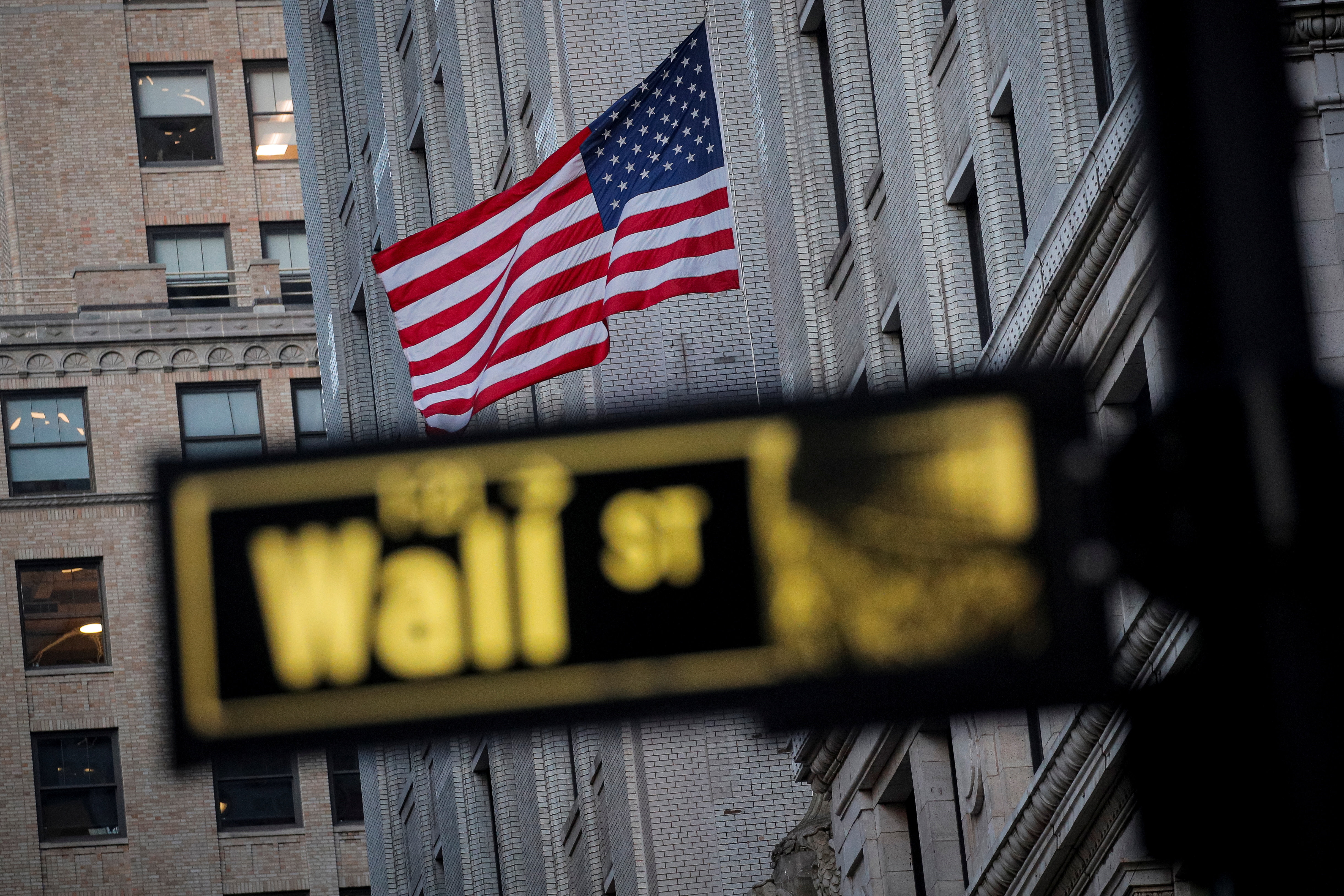
The U.S. flag is seen on a building on Wall St. in the financial district in New York, U.S., November 24, 2020. REUTERS/Brendan McDermid
NEW YORK, Aug 4 (Reuters) – A highly awaited inflation report and elevated bond yields offer the latest test to a U.S. stock rally that has delivered hefty gains this year.
The benchmark S&P 500 index is up 16.6% year to date, fueled by an improving economic outlook, excitement over developments in artificial intelligence and signs that the Federal Reserve is close to ending its market-bruising U.S. interest rate hikes.
Stocks’ near-term trajectory, however, may depend on whether next week’s inflation report shows consumer prices remaining subdued. Investors are also closely watching the path of Treasury yields, which rattled equity markets in recent days by rising to fresh year highs. The S&P 500 fell 2.27% this week, its biggest weekly decline since March 10.
“After a massive run-up in equities … any sort of blip in terms of any of the macro data (is) probably going to be a reason for people to take profits,” said Jack Janasiewicz, lead portfolio strategist and portfolio manager at Natixis Investment Managers.
While consumer prices have not been rising as fast lately, some investors worry stubborn inflation may force the Fed to leave rates at current levels longer than expected. The U.S. reports consumer price data on Aug. 10.
On Friday, U.S. employment data showed the economy maintained a moderate pace of job growth. Yet wages grew at a faster-than-expected annual clip of 4.4%. Many fear that is too high to be consistent with the Fed’s 2% inflation target.
Janasiewicz of Natixis said a stronger-than-expected consumer price reading next week could spark a decline of up to 5% in the S&P 500. He said such a drop would be “healthy” given the index’s big runup this year.
Other investors have been taking profits. Concerns over rising stock valuations pushed Aaron Chan, a managing partner at equity hedge fund Recurve Capital, to trim stakes in shares of companies including Amazon.com (AMZN.O), which is up 68% this year, and Norwegian Cruise Line (NCLH.N), up 47%.
The S&P 500 is trading at about 19.5 times forward 12-month earnings estimates, much pricier than its long-term average of about 15.6 times, according to Refinitiv Datastream.
Rising global prices for oil and food, which the Fed’s rate increases do little to control, may have more sway on inflation in coming months, said Tim Murray, a capital markets strategist at T. Rowe Price.
Prices for Brent crude were on track for their sixth straight week of gains, up roughly 17% in that period on signs of tightening global supply and rising demand.
“As long as CPI remains flat to trending down, the market will accept it thoroughly,” said Ann Miletti, Allspring’s head of active equity. “If we do see upticks, it is really dependent on where the upticks are and whether or not investors believe they’re temporary in nature.”
Miletti is growing more bullish on corners of the market that have underperformed, including small cap stocks.
A stronger-than-expected inflation number next week could also boost Treasury yields further. Yields, which move inversely to bond prices, spiked this week following a downgrade of the U.S. credit rating by Fitch and on the prospect of a flood of Treasury supply in the third quarter. The benchmark 10-year yield fell sharply after Friday’s jobs report but remained above 4%, a level last seen in November 2022.
Rising yields on Treasuries, viewed as among the world’s safest investments because they are backed by the U.S. government, can dull the allure of stocks. Projected company cash flows are also worth less in current dollars when interest rates rise.
“The move in the 10-year U.S. Treasury yield above the 4% level will likely act as a headwind to further expansion in already lofty equity valuations,” Keith Lerner, co-chief investment officer at Truist Advisory Services, wrote this week.
There is still plenty of good news to keep the rally going. Earnings from Wall Street heavyweights Amazon (AMZN.O) and Google-parent Alphabet (GOOGL.O) have exceeded analysts expectations, though disappointing earnings from Apple (AAPL.O) sent the stock tumbling 4.8% on Friday.
More broadly, more than 79% of S&P 500 companies have beaten estimates for the second quarter so far, the highest beat rate since the third quarter of 2021, data from Refinitiv I/B/E/S showed.
The past week also saw analysts from BofA Global Research and JPMorgan revise their forecasts for a U.S. recession.
Still, some market participants believe investors may have to endure some near-term turbulence.
“Our expectation is that the market takes some time to digest the strong year-to-date gains and moves into a choppy period,” Lerner said.
Reporting by Carolina Mandl in New York; Additional reporting by Lewis Krauskopf; Editing by Ira Iosebashvili and David Gregorio
: .

